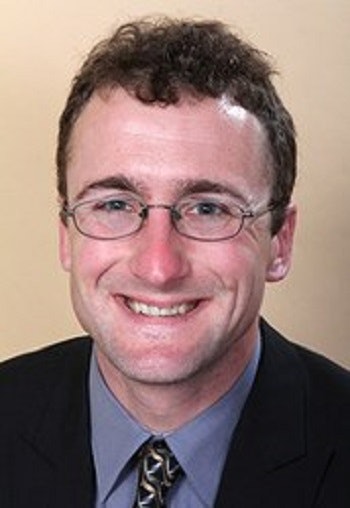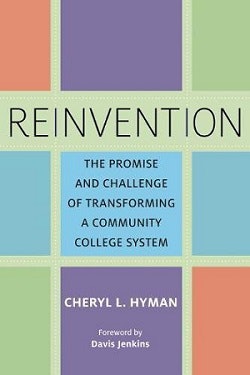There are few books that I looked forward to reading as much as Cheryl L. Hyman’s Reinvention: The Promise and Challenge of Transforming a Community College System.
 Dr. David Lucander
Dr. David LucanderI’m not only a tenured faculty member at a community college, my journey from knucklehead high-schooler to the professoriate began at one in 1999. From both sides of the desk, I have seen the transformative power of public higher education. Naturally, I was excited to delve into a book that promised a vision for improving the effectiveness of a place that means so much to me.
Each year, more than 10 million people, roughly one-third of the nation’s undergraduates, are served by community colleges. These classrooms see a diverse constituency that includes individuals earning career credentials, students taking their first steps toward a bachelor’s degree and immigrants coming to learn English.
Any reasonable person would be on board for a plan to do this job better. Underperforming faculty teaching an obsolete curriculum, inefficient offices providing redundant services and despicably low completion rates are not achievements to be proud of.
These were just some of the challenges Hyman faced when she was appointed chancellor of the City Colleges of Chicago. With over 120,000 students spread across seven campuses and a budget over $650 million, the task of overseeing basic operations was enormous. Hyman ambitiously sought to do this and more. She promised to overhaul the entire system through a program called “reinvention,” and her experience through this tumultuous period is the basis of this book.
Rightly or not, others’ perception of Hyman’s sweeping reforms was filtered through the lens of her being a vice president for operations and business strategy at a Fortune 500 electric company, with no experience whatsoever working in higher education.
Outsiders can bring fresh approaches and push the envelope, but Hyman did not understand that the blowback she experienced was instigated by something more than what she dismisses as “the insularity of academia.”
Professors can be as narrow-minded as any group, but there is an expectation that organizational leadership have some level of personal familiarity with the field about to be reformed.
If it isn’t unreasonable for pipefitters to fail to embrace a dentist as head of their union, or firefighters to reject leadership from an actuary, then Hyman should appreciate that something other than provincialism drove faculty and staff to distrust her corporatist agenda and strident championing of performance-based funding.
“If there’s one thing educators don’t like to hear,” Hyman argues, “it’s that education should be run more like a business.”
A business-oriented approach, however, has significant limits. Case in point: Hyman promised to reinvigorate Chicago’s community colleges through a technocratic program of data-driven accountability, with an emphasis on goals, strategy and results — and indeed there was improvement. Some of that progress, however, was a mirage. For example, an external watchdog group found that Hyman’s administration padded graduation rates by retroactively conferring hundreds of degrees to students who had not taken classes in years.
Just as corrupt police departments misuse Compstat to manipulate crime statistics in order to prove the success of their operations, integrity-starved education administrators present fraudulent information to create the illusion of improvement. Numbers don’t lie, but people do.
The problem with Hyman’s guiding principle, however, is deeper than a rigged spreadsheet. Let’s talk about the truth, not the facts — because facts can sometimes obscure the truth. Teachers at all levels hear about “accountability,” but sincere education reformers like Hyman should be advancing a different word: “integrity.” At all levels of public higher education, integrity must be a guiding principle.
Integrity means that professors strive to offer the best classroom experience possible. We should return graded assignments quickly, teach lesson plans that speak to all kinds of learning styles and offer curricula that are enhanced by ongoing professional development.

For staff, integrity means that students are treated with the courtesy and respect they deserve, not just as “customers” but also as people who have entrusted us with their futures. That’s the real “reinventing” needed by a system that we have repeatedly called upon to be the engine of upward mobility, job retraining and personal transformation.
Community college, rather than being a failed institution, has a proven track record of improving the lives and livelihoods of uncounted millions of Americans since this nation democratized education by inventing the very idea of community college in the early twentieth century.
This is what it all adds up to, and where I have a fundamental disagreement with the author. Hyman thinks that implementing strategic master plans leads to institutional success, but after 15 years of teaching and a personal history of being the product of public education from K through Ph.D., I know that a college is only as good as its people.
We need to do better. We need unions that decline to protect faculty who are a disgrace to our vocation — because bad teachers damage communities just like bad cops do. We need reliable support staff that appreciate their role as public servants — because every student that they help can be a success story. We need administrators who make sure all the paperwork is in place, the bills are paid and classrooms are full — but not overfull. We need creative senior leadership that knows how to do more with less because shortsighted state legislatures — including Hyman’s own state, Illinois, and mine, New York — repeatedly reduce funding for public higher education.
Hyman is right that college credit cards should not be abused, spending for employee travel should be reasonable, maintenance shouldn’t be indefinitely deferred and transfer articulation agreements should be made. She is also right that many schools need to redesign clunky websites, revamp hiring procedures and reinvest in support services to make sure that students graduate on time. This is called “common sense.”
We need more of it, and less jargon about “data systems and metrics-driven decision support.” Here’s some more plain talk: fake collaboration is not shared governance, and transforming the tried and true position of “provost” to “executive vice chancellor of strategy and academic governance” does not mean reform, and the last thing American schools need are lower standards that serve to boost completion rates.
“To be an effective leader,” Hyman writes, “you have to be willing to walk away at any time.” This is a strange assertion from someone who so ardently advocates for educational accountability. Where is the accountability for leaders who damage the very institutions that they claim to revere once they walk away? Hyman claims to have resigned, but another interpretation of her departure is that she was unceremoniously drummed out after a nearly unanimous vote of no confidence.
Whether on her terms or not, this “leader” indeed walked away.
Dr. David Lucander is an associate professor of multicultural studies at Rockland Community College, SUNY.
This article appeared in the May 3 issue of Diverse magazine.



















